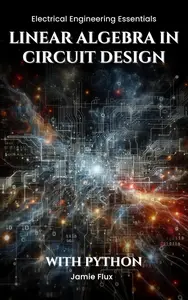
Free Download Linear Algebra in Circuit Design: With Python (Electrical Engineering Essentials with Python) by Jamie Flux
English | October 1, 2024 | ISBN: N/A | ASIN: B0DJCQQ7FX | 373 pages | PDF | 1.41 Mb
Immerse yourself in the sophisticated world of circuit design with a comprehensive guide that marries the intricate principles of linear algebra with practical applications in electrical circuits. With Python code provided for each chapter, this resource serves as both a theoretical primer and a hands-on manual for engineers, students, and enthusiasts in the field of electronics and electrical engineering.
Key Features:
- Integrate linear algebra concepts seamlessly into circuit analysis and design.
- Explore 65 meticulously crafted chapters, each with Python code to enable practical learning and application.
- Grasp foundational and advanced topics in linear algebra and their critical roles in modern circuit design.
- Gain insight into both classic and cutting-edge analysis techniques and simulation models.
What You'll Learn:
- Master the foundational concepts of vectors and scalars essential for understanding circuit variables.
- Decode the utility of matrix notation in simplifying complex circuit equations.
- Utilize complex numbers and phasors for effective AC circuit representation.
- Understand the formation of vector spaces with circuit variables and assess linear independence.
- Model circuit components like resistors and capacitors through linear transformations.
- Solve systems of linear equations to decode intricate circuit networks.
- Analyze circuit behavior and solvability using determinants.
- Apply eigenvalues and eigenvectors for RLC circuit behavior prediction.
- Simplify multi-component circuit analysis via matrix diagonalization.
- Compute energy metrics in circuits through inner product spaces.
- Harness orthogonality in vector spaces for signal processing efficiency.
- Approach Fourier Transform with a linear algebra perspective to decode circuit frequency components.
- Transform circuit differential equations into algebraic forms using the Laplace Transform.
- Handle complex circuit inputs and outputs with state-space representation.
- Deploy transfer functions for comprehensive system behavior analysis.
- Ensure circuit stability through advanced linear algebra techniques.
- Draw connections between linear algebra and network theory using mathematical graphs.
- Perform matrix-based mesh analysis for systematic circuit problem-solving.
- Conduct nodal analysis by framing and resolving nodal equations with linear algebra.
- Explore linear circuits with dependent sources through algebraic approaches.
- Optimize circuit design using linear programming and advanced optimization techniques.
Linear Algebra in Circuit Design With Python Torrent Download , Linear Algebra in Circuit Design With Python Watch Free Link , Linear Algebra in Circuit Design With Python Read Free Online , Linear Algebra in Circuit Design With Python Download Online
